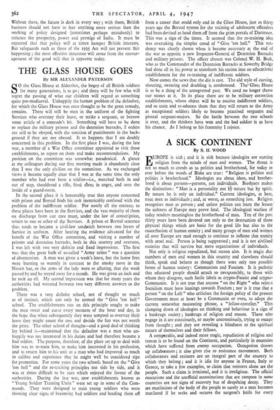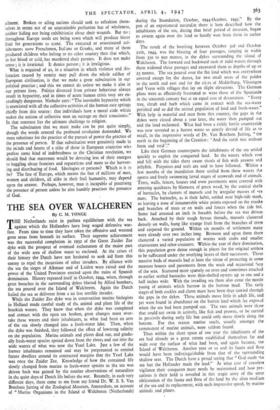A SICK CONTINENT
By S. H. WOOD
EUROPE is sick ; and it is sick because ideologies are ousting religion from -the minds of men and women. The threat is not so much to creeds as to politics and brotherhood, for today as ever before the words of Blake are true: "Religion is 'politics and politics is brotherhood." Ideologies are about ideas, and brother- hood is about persons—persons, not individuals. Berdydev makes the distinction: "Man is a personality not bl nature but by spirit. By nature he is only an individual" Current ideologies, at best, treat men as individuals ; and, at worst, as something less. Religion recognises man as person ; and unless politics can learn the lesson' the sickness of Europe inay prove fatal. The ideological warfare of today renders meaningless the brotherhood of man. Ten of the past thirty years have been devotednot only to the destruction of those physical things which are basic for the good life but also to the exacerbation of human enmity ; and many groups of men and Women all over Europe are mad enough. to continue to inflame that enmity with cruel zeal Person is being suppressed ; and it is not civilised societies that will survive but mere organisations of individnals.
Not only is religion repudiated, but reason also. It is tragic that numbers of men and women in this country and elsewhere should think, speak and behave as though there were only two possible forms of human society: Communism and Fascism. It is pathetic that educated people should attach so irresponsibly, to those with whom they disagree, such facile labels as crypto-Fascist and crypto- Communist. It is not true that anyone "on the Right" who rejecis Socialism must have leanings towards Fascism ; nor is it true that a person "on the Left" who criticises the foreign policy of the present Government must at heart be a Communist or even, to adopt the current somewhat nauseating phrase, a "fellow-traveller." This clamping down of ideologies on thinking and behaviour -is a sign of a bankrupt society ; bankrupt of religion and reason. Those who engage in it are consciously, or maybe unconsciously, trying to escape from thought ; and they are revealing a blindness to the spiritual nature of themselves and their fellows.
A comparable, and indeed more tragic, repudiation of religion and reason is to be found on the Continent, and particularly in countries which have suffered from enemy occupation. Occupation throws up collaborators; it also gives rise to resistance movements. Both collaborators and resisters are- an integral part of the country to which they belong ; and it is idle for anyone in France, Italy or Greece, to take a few: examples to claim that resisters alone are the people. Such a claim is irrational, and it is irreligious. The official executions and the unofficial assassinations that are rampant in some countries are not signs of recovery but of deepening decay. They are mutilations of the body of the people as surely as a man becomes mutilated if he seeks. and secures the surgeon's knife for every
ailment. Broken or ailing nations should seek to refashion them- selves in fterms not of an unattainable perfection but of wholeness, neither hiding nor being exhibitionist about their wounds. But no ; throughout Europe seeds are being sown which will produce bitter fruit for generations to come. The executed or assassinated col- laborators were Frenchmen, ItaF.ans or Greeks, and many of them produced children who belong to no other country than that which, in hot blood or cold, has murdered .their parents. It does not make sense ; it is irrational. It denies person ; it is irreligious.
What is required of us, in a situation in which violence and dis- location caused by enmity may pull down the whole edifice of European civilisation, is that we make a great substitution in our political practice ; and this we cannot do unless we make it also in our private lives. Politics divorced from private behaviour always result in hypocrisy, and in times of acute human crisis tney are ex- ceedingly dangerous. Niebuhr says: "The inevitable hypocrisy which is associated with all the collective activities of the human race springs chiefly from this source: that individuals have a moral code which makes the actions of collective man an outrage on their conscienc.:."' In that sentence lies the ultimate challenge to religion.
The substitution that we must make can be put quite simply, though the words conceal the profound revolution demanded. We must substitute for the practice of the pursuit of power the practice of the presence of person. If that substitution were genuinely made in the minds and hearts of a tithe of those in European countries who profess some kind of indebtedness to the Christian revelation, we should find that statesmen would be devoting less of their energies to haggling about frontiers and reparations and more to the harvest- ing and distributing of food. Ideologies or persons? Which is it to be? The fate of Europe, which means the fate of millions of men, women and children, all alike in their frail humanity, may depend upon the answer. Perhaps, however, man is incapable of practising the presence of person unless he also humbly practises the presence of God.



































 Previous page
Previous page